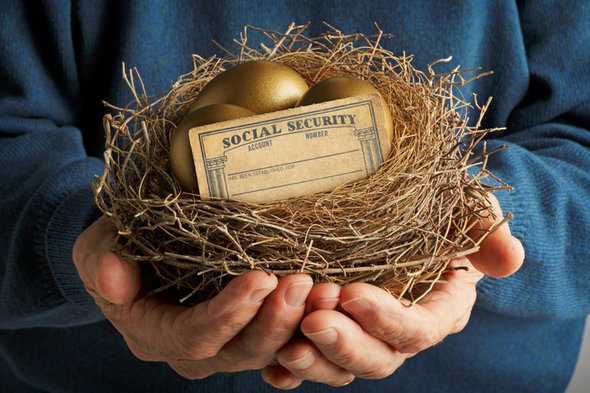Can I Draw Ss at 60

Many adults look forward to retirement. And some wouldn't mind leaving the workforce ahead of schedule. But few people think about the drawbacks of retiring early. Few realize that an early retirement might affect their long-term financial plan and their access to certain benefits. A financial advisor can help you figure out all of your retirement and social security issues.
When Can I Get Social Security?
The earliest you can start receiving Social Security benefits is age 62. But the earlier you elect to receive your benefits, the smaller your monthly checks will be (losing as much as 30%). To receive full benefits, you will have to avoid collecting Social Security until you reach your full (or normal) retirement age. For people born in 1960 or later, that age is 67. And with the delay retirement credits, you can get your largest benefit at age 70.
If you decide to retire early, you have the option of delaying your Social Security benefits. This strategy may work particularly well for married couples.
Early Retirement and Social Security Payments
If you're wondering how much you'll get from Social Security, you can check out our Social Security calculator. It estimates how much you'll earn depending on your annual income, the year you were born and when you choose to start receiving benefits.
The calculations for Social Security benefits come from your highest 35 years of earnings. That's how the Social Security Administration comes up with your average monthly indexed earnings (AIME). If you retire too early (i.e. before earning a paycheck for at least 35 years), you'll receive less Social Security. That's the downside to an early retirement.
By retiring early, you'll also miss out on the chance to claim delayed retirement credits. Social Security increases a percentage of your retirement benefits each month that you delay after full retirement age until you turn 70. So if your full retirement age is 67 but you avoid taking Social Security until three years later, then you can claim 124% of your full monthly benefit amount.
The table below comes from the Social Security benefits retirement planner and calculates the monthly increase rate by birth year:
| Delayed Retirement Increase | |||||
| Birth Years | 12-Month Increase Rate | Monthly Increase Rate | |||
| 1933 to 1934 | 5.5% | 11/24 of 1% | |||
| 1935 to 1936 | 6% | 1/2 of 1% | |||
| 1937 to 1938 | 6.5% | 13/24 of 1% | |||
| 1939 to 1940 | 7% | 7/12 of 1% | |||
| 1941 to 1942 | 7.5% | 5/8 of 1% | |||
| 1943 and later | 8% | 2/3 of 1% | |||
By comparison, if you choose to retire early, your Social Security check gets reduced by 5/9 of 1% for each month you collect benefits before your full retirement age (up to 36 months). If you retire more than 36 months early (up to a maximum of 60), your Social Security benefit will be reduced by an additional 5/12 of 1% per extra month.
This means that the maximum number of retirement months is 60 for those retiring at age 62 when the full retirement age is 67. So your benefits could be reduced by up to 30%. Social Security calculates this maximum by multiplying 36 months by 5/9 of 1% and then adds total of 24 months multiplied by 5/12 of 1%.
What If I Want to Work in Retirement?

Sometimes leaving the workforce is neither feasible nor appealing. That's why some retirees find part-time jobs to pass the time or earn extra money.
Getting a part-time job after retiring early may reduce your benefit amount until you reach full retirement age. The SSA may withhold a certain amount of money from your benefit check if your earnings exceed the annual limit. For 2021, your benefits will be reduced by $1 for every $2 you earn above $18,960. If you'll reach your full retirement age in 2021, your benefits will be reduced by $1 for every $3 you earn above a different limit ($50,520) up until the month you turn 67. For a comparison, benefits were reduced in 2020 by $1 for every $2 earned above $18,240, and reduced by $1 for every $3 earned above $48,600 for those who reached full retirement age that year.
The SSA doesn't penalize working retirees forever. You'll receive all of the benefits the government withheld after you reach your full retirement age. At that time, the SSA recalculates your benefit amount.
Can Too Many Early Retirees Affect Social Security?
Regardless of when you retire, you'll receive around the same amount of Social Security benefits over your lifetime. This is due to cost-of-living adjustments that attempt to protect seniors from inflation.
In other words, Social Security balances itself out. Early retirees receive lower monthly benefits over a long period of time while late retirees receive larger benefit amounts over a short period of time. Retiring early does not affect the Social Security program's finances because the amount of benefits available does not depend on how early or late someone retires.
Bottom Line

Not everyone can retire early. But let's say you're preparing to quit your job before you reach your full retirement age. In that case, it's important to think about how that might affect the size of your Social Security checks.
If you can wait to take Social Security, you'll end up with larger benefit checks. Whatever you choose to do, it's best to make sure your money will last throughout your entire retirement.
Tips for Getting Retirement Ready
- Retirement planning with a financial advisor can be extremely helpful. Finding a qualified financial advisor doesn't have to be hard. SmartAsset's free tool matches you with up to three financial advisors in your area, and you can interview your advisor matches at no cost to decide which one is right for you. If you're ready to find an advisor who can help you achieve your financial goals, get started now.
- Figure out how much you'll need to save to retire comfortably. An easy way to get ahead on saving for retirement is by taking advantage of employer 401(k) matching.
Photo credit: ©iStock.com/DNY59, ©iStock.com/gpointstudio, ©iStock.com/DragonImages
Lauren Perez, CEPF® Lauren Perez writes on a variety of personal finance topics for SmartAsset, with a special expertise in savings, banking and credit cards. She is a Certified Educator in Personal Finance® (CEPF®) and a member of the Society for Advancing Business Editing and Writing. Lauren has a degree in English from the University of Rochester where she focused on Language, Media and Communications. She is originally from Los Angeles. While prone to the occasional shopping spree, Lauren has been aware of the importance of money management and savings since she was young. Lauren loves being able to make credit card and retirement account recommendations to friends and family based on the hours of research she completes at SmartAsset.
Source: https://smartasset.com/retirement/does-early-retirement-affect-social-security